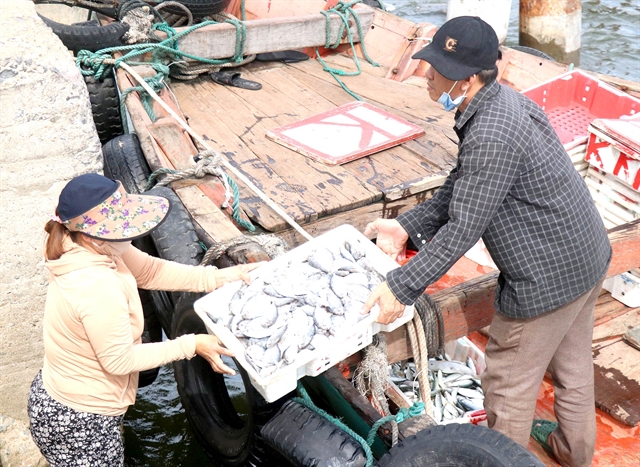 Society
Society

The price of diesel oil has been increasing continuously, causing many fishermen to leave their fishing boats on shore for days at a time, resulting in falling output and income for fishermen.

|
| A trader buys fish directly from a vessel at a port in the central province of Quảng Trị. VNA/VNS Photo Nguyên Lý |
QUẢNG TRỊ The price of diesel oil has been increasing continuously, causing many fishermen to leave their fishing boats on shore for days at a time, resulting in falling output and income for fishermen.
Some fishermen have even left the trade to find other employment. Meanwhile, the fishing boats on shore become degraded and damaged. The knock-on effect is processing companies are also facing a possible shortage of raw materials
In the central province of Quảng Trị, fishermen brought many large-capacity fishing boats to anchor near the shore at the North Cửa Việt anchorage area, Gio Việt commune, Gio Linh District, despite the fact that it is the middle of the fishing season, which ends in September.
From the beginning of 2022, to reduce the negative impacts of rising fuel prices and sea voyages, fishermen have diversified their fishing professions.
They head to the sea in groups to bring their caught seafood back to shore and focus on exploiting high-value seafood. However, recently, the increased price of oil has forced the price of other commodities up, making the cost of each sea trip beyond what fishermen can afford.
Võ Văn Thức, in Cửa Việt Town, Gio Linh District, said that he borrowed loans to build a fishing boat with a capacity of 800CV.
According to Thức, a 20-day offshore trip need about 10,000 litres of diesel fuel and costs more than VNĐ300 million. He also had to pay VNĐ20 million for 1,000 ice blocks to preserve seafood, as well as other expenses for labour and food. In total, an offshore fishing trip costs between VNĐ420 and 430 million.
Since the beginning of the year, he made two fishing trips and after deducting all costs, he suffered a loss of more than VNĐ100 million each trip, he said.
Meanwhile, he still has to pay back interest to the bank each month, adding he would rather halt his fishing.
According to the Quảng Trị Province's Statistical Office, the province's fishery production last month was estimated at 2,907 tonnes, down 0.62 per cent over the same period last year.
The decrease in seafood production also means that the income of fishermen decreases. Therefore, many seafarers, especially young workers, take up other work.
After six months of lying on the shore, the offshore 700 CV fishing vessel of Phạm Tánh from Tam Quan Nam Ward, Hòai Nhơn Town in Bình Định Province, set sail for the first time early this month.
Tánh said that they caught about 20 tonnes of striped tuna during that trip. However, both boat owners and the crew were unhappy as the price of fish has not increased, while the price of oil more than doubled and the cost of materials and the cost of the voyage has also increased.
Ship owner Võ Văn Toàn from Hoài Thanh Commune, Hoài Nhơn Town, said that with decades of experience in the marine industry he knew that when oil increased, staying on shore was better.
"From the beginning of the year, I only made two trips. Some fishermen had to borrow money to make ends meet due to fishing halt," he said.
Phạm Anh Dũng, Deputy Director of Bình Định Fishing Port, said that as fuel prices increase, almost all fishing vessels were ashore.
"Vessels in and out the fishing port reached 65 per cent over the same period," he said, adding that fishing was not profitable so fishermen do not go to sea.
According to the Ministry of Agriculture and Rural Development, since the beginning of the year, the price of diesel, the main fuel for fishing vessels, has increased by 65 per cent.
In addition, following the increasing fuel prices, the prices of other commodities for fishing activities increase by about 10-15 per cent, leading to an increase in input costs by 35-48 per cent.
Meanwhile, the price of seafood increased insignificantly. The above difficulties lead to many fishing boats halting their work.
The ministry proposed the Ministry of Industry and Trade and the Ministry of Labour, Invalids and Social Affairs consider and propose the Government have policies to support fishing boat crew.
Accordingly, the ministry proposed supporting crew members working on fishing vessels that temporarily stopped production due to rising fuel prices. The immediate support period is six months.
The level of support according to the regional minimum wage applicable to employees is specified in the Government's Decree No 90/2019/ND-CP dated November 15, 2019, stipulating the regional minimum wage for employees under an employment contract. VNS




